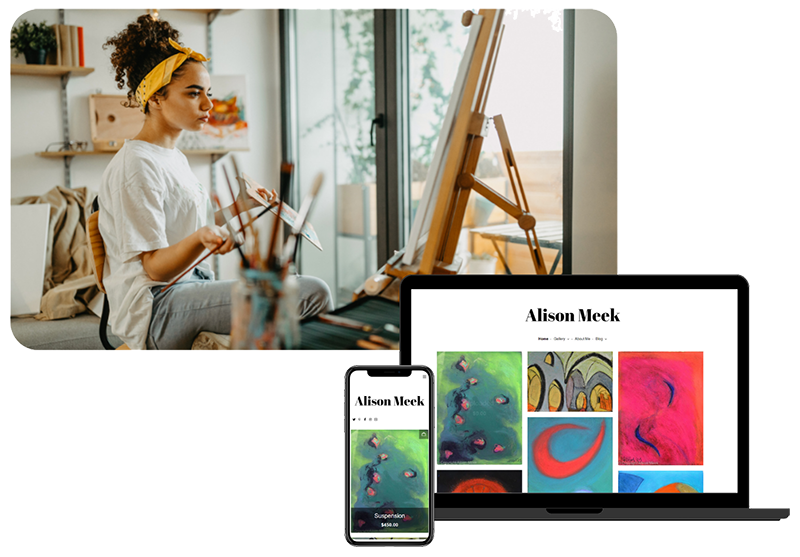If you often find yourself overwhelmed by endless to-do lists, frequently stressed, and creatively impeded by the monotony of administrative tasks, it could be time to hire an assistant. Whether you need help with marketing, bookkeeping, or in the studio, delegating part of your workload to an assistant can take some weight off your shoulders, freeing you up to concentrate on your art. In this article, we consider the benefits of hiring an extra pair of hands, how to find the right candidate, and how to make sure you get the most out of your time and investment.

What are the benefits of hiring an artist’s assistant?
Artists are used to juggling a variety of tasks in their day-to-day working life, but as these demands pile up, they can lead to burn-out. Eventually, as the cost of doing everything yourself outweighs the cost of an employee, an assistant can help significantly reduce your workload and stress. They can supplement your knowledge in the places where you need it, and even teach you new skills along the way. For example, an assistant with a specific knowledge of digital marketing may expose you to new strategies you could implement independently in the future. A fresh perspective can turbocharge your business, bringing in new ideas, methods of organising, communicating and planning. What’s more, most assistants are artists themselves, so they can be great sounding boards for new projects, offering a second opinion when in doubt.
Creating a job specification
The first step in the hiring process is to clarify exactly what you’re looking for. A good job specification should answer the following: What? Who? When? Where? How often? How much? With a pen and paper, draw six columns with these titles, and use these to make notes.
If you often find yourself overwhelmed by endless to-do lists, frequently stressed, and creatively impeded by the monotony of administrative tasks, it could be time to hire an assistant. Whether you need help with marketing, bookkeeping, or in the studio, delegating part of your workload to an assistant can take some weight off your shoulders, freeing you up to concentrate on your art. In this article, we consider the benefits of hiring an extra pair of hands, how to find the right candidate, and how to make sure you get the most out of your time and investment.
What are the benefits of hiring an assistant?
Artists are used to juggling a variety of tasks in their day to day working life, but as these demands pile up, they can lead to burn-out. Eventually, as the cost of doing everything yourself outweighs the cost of an employee, an assistant can prevent you from overwhelm. They can supplement your knowledge in the places where you need it, and even teach you new skills along the way. For example, an assistant with a specific knowledge of digital marketing may expose you to new strategies you could implement independently in the future. A fresh perspective can turbocharge your business, bringing in new ideas, methods of organising, communicating and planning. What’s more, most assistants are artists themselves, so they can be great sounding boards for new projects, offering a second opinion when in doubt.
Creating a job specification
The first step in the hiring process is to clarify exactly what you’re looking for. A good job specification should answer the following: What? Who? When? Where? How often And How much? With a pen and paper, draw six columns with these titles, and use these to make notes.
1. What do you need assistance with?
Reflect on what is currently holding you back. Do you need help documenting your work or managing your schedule? Perhaps you need someone to manage your online presence or help out at events? Make a list of all the tasks your assistant will encounter in the role. Identifying your requirements will allow you to hone in on the skill sets of your ideal candidate.
2. What kind of person are you looking for?
Look over the last column and ask yourself, what skills are necessary for these tasks, and which are desirable? For example, if your focus is on financial assistance, you may list experience in a similar role as necessary, and a maths degree desirable. Do they need to be flexible? Should the possess additional language requirements? Are there certain software programmes they will need to use? Of course, certain skills can be learned on the job, so do take into account the overall characteristics of your ideal candidate, too.
3. How often will you need them?
Will you need an assistant for six months in the run-up to a big show? Or do you require more consistent support? Consider what works best for your needs. If there are certain times in the year that are particularly stressful, mention that! Whether it’s ongoing or seasonal, one day a week or full-time, being honest about your expectations will prevent confusion further down the line.
4. When and where?
What kind of hours your assistant will work: morning, afternoons or evenings? Will they be based in your studio, or can the work be done remotely? Do you expect travel will be part of the job? If so, do they have a passport or a driving license? Do they own a car? Details like these can be easily overlooked, so it’s important to consider them in advance.
5. How much?
Decide what is fair compensation for the role, and the level of experience it requires. The role should provide real value for both parties, whether financially or through other means, like mentorship, so make sure you keep your side of the arrangement. Ask yourself what you would be happy to accept in that position, and make the rate clear from the start. Is it paid hourly, or a set fee for a particular project, for example? Ask around to find an appropriate rate, and indicate the exact terms of employment within the job specification. When it comes to successful working relationships, transparency is always key.

What next?
Once you have your job spec, you’re ready to advertise. Consider where your ideal candidate might look for opportunities? Post to job boards specifically for the arts, advertise in local art schools, or put out an open-call on your social media pages — you never know who may be interested. Once applications are in, look for those who have followed directions and outlined their experience specific to this particular role, and arrange a meeting or phone call with a handful of stand-out candidates. Identify the assets you find most important and create a few questions around these. Often, you’ll know instinctively if a person is the right match for you professionally, so no need to be overly formal.
General tips
- Choose someone enthusiastic about your work. Enthusiasm and willingness to learn can sometimes trump exact experience.
- Be open to new ways of working. A fresh pair of eyes could be the boost your business needs!
- Communicate your exact requirements and compensation from the start.
- Learn to love to-do lists, and find a way to keep track of tasks. A shared Google document, for example, or management platforms like Asana — but don’t overcomplicate it; stick to one system.
- Set deadlines and expectations.
- Schedule check-ins with your assistant to address any concerns, and to applaud good work. An appreciated assistant is a happy assistant!







